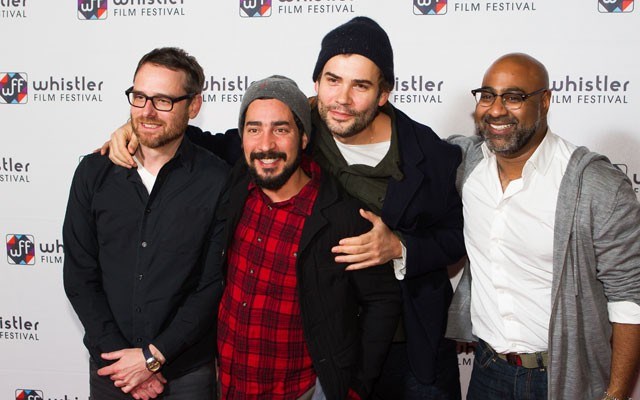It was a near clean sweep for Jamie Dagg's evocative debut feature, River, at the Whistler Film Festival's (WFF) awards brunch on Sunday, earning three wins in the prestigious Borsos program. The stunning story of a doctor who becomes embroiled in a criminal scandal after intervening in the sexual assault of a young woman in Laos earned widespread acclaim from the jury for this year's Borsos awards, taking home the top prize in three different categories.
"It's the first award I've ever won," says director Jamie Dagg two days after the festival closed. "This was such a challenging film to make, so it's so nice to have your hard work acknowledged by your peers."
Recognized for its "powerful presentation of one man's moral dilemma in a filmmaking style that is ambitious and authentic despite the enormous challenge of its complex international location," the film was awarded $30,000 in cash and prizes and the honour of being named the 2015 Borsos winner for Best Canadian Feature.
The film, which was shot on location in Laos, Thailand and Canada, also won Dagg the hardware for Best Screenplay and Best Director in a Borsos film, beating out 19 other Canadian features.
"It's the first North American film to be shot in Laos, and with that comes a lot of challenges," says Dagg. "It's a communist dictatorship and there's no real film infrastructure there, but I think that helped lend a sense that (the tension in the film) is real."
Past Borsos winners have carried that momentum into bigger opportunities. Last year's Best Canadian Feature, Maxime Géroux's French-language Felix et Meira, didn't get a lot of attention until WFF, but went on to be selected as Canada's entry to the 2015 Academy Awards in the best foreign-language film category. While River secured a distribution deal in August, Dagg is hopeful the Borsos win will help build the buzz around the movie. It's slated for a Canadian theatrical release in early 2016.
"It's hard for anything outside of people wearing tights and a cape to be shown in a theatre, so I'm really happy we're going to be able to show it," he adds.
Although lead actor Rossif Sutherland, who calls his time on the set of River "the experience of a lifetime," earned major plaudits from the Borsos jury as well, it was ultimately actor Paul Savoie who nabbed the Best Performance in a Borsos Film Award for his turn in the stirring adaptation of an Anton Chekov story, The Diary of An Old Man. Judges lauded the Montreal actor's "deep humanity and internal tenderness" in the role of an elderly man reckoning with his privileged life as an academic.
The final Borsos award, for Best Cinematography, went to He Hated Pigeons cinematographer Dylan Macleod, whose work judges say, "really defined what was beautiful and powerful about the film." Director Ingrid Venninger's movie about a young man's journey across Chile was dedicated to Macleod's mother, who passed away on the final day of shooting.
Another breakout film this year was Hui Wang's moving documentary, Last Harvest, about an elderly Chinese couple evicted from their farm to make way for a controversial water diversion project. It earned the first-time director the World Documentary Award as well as the trophy for Best Female Directed Documentary.
"It's not easy these days to be an emerging filmmaker, and it's even harder when you're a female filmmaker of colour, so this means a lot," says Wang. "This is the kind of encouragement and inspiration I need to continue to work hard and make movies because it shows people love my film and my storytelling style."
The fest enjoyed a strong female presence compared to other festivals at a time when gender equality in the industry has come to the fore. The program included eight women feature filmmakers and 18 female short filmmakers, as well as a panel discussion led by This Hour Has 22 Minutes' Mary Walsh on the hurdles facing women in Hollywood.
"The female presence was unintentional, it just kind of happened by chance," said WFF director Shauna Hardy Mishaw. "It sent a strong statement in terms of the fact that there's an issue in the industry with regards to gender equality. I think the festival provided an unintentional platform for that issue to bubble to the surface."
Todd Haynes' Oscar contender Carol, starring Cate Blanchett and Rooney Mara, was voted the Audience Award winner. There were more than 13,000 attendees to the 15th edition of WFF, an 18-per-cent jump from 2014.




